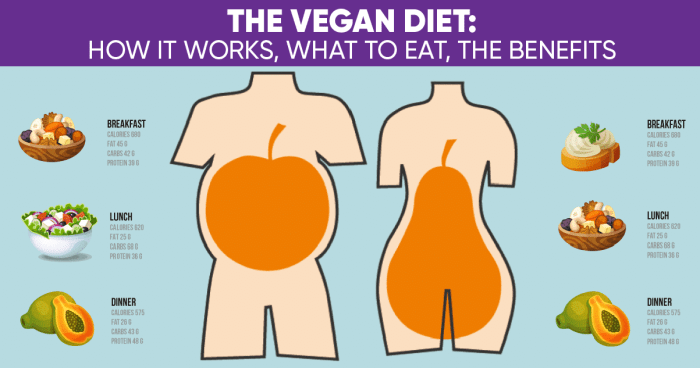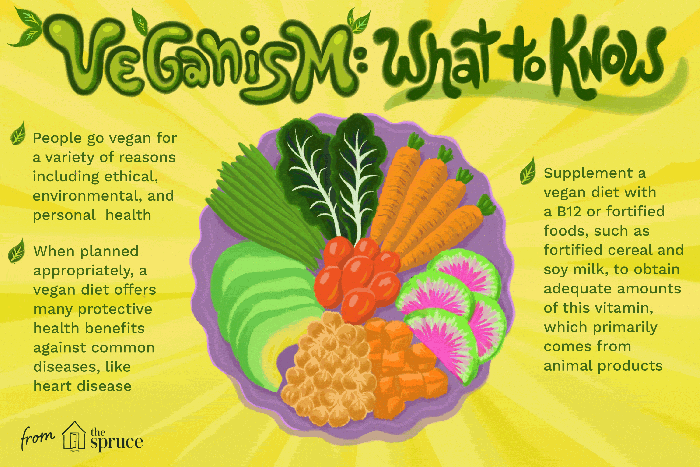Is being vegan healthy? This question has sparked debates and discussions for years. In this article, we delve into the nutritional benefits, challenges, and ethical implications of a vegan diet to provide you with a comprehensive understanding of its impact on your health and the world around you.
Vegan diets have gained immense popularity due to their potential health benefits and ethical concerns. By abstaining from all animal products, vegans aim to promote well-being and reduce their environmental footprint. But is this lifestyle truly as healthy as it seems?
Let’s explore the evidence.
Nutritional Benefits of a Vegan Diet

A vegan diet, which excludes all animal products, can provide a range of nutritional benefits. Compared to non-vegan diets, vegan diets are typically higher in fiber, antioxidants, and certain vitamins and minerals. They are also lower in saturated fat and cholesterol.
Nutrient Comparison
A study published in the Journal of the American Dietetic Association found that vegans had significantly higher intakes of fiber, vitamin C, vitamin E, folate, magnesium, and potassium compared to non-vegans. They also had lower intakes of saturated fat and cholesterol.
Health Benefits
The nutritional benefits of a vegan diet have been linked to a number of health benefits, including:
- Reduced risk of heart disease
- Lower blood pressure
- Improved blood sugar control
- Reduced risk of certain types of cancer
- Weight management
Considerations for a Vegan Diet
Adopting a vegan lifestyle offers numerous health benefits, but it also comes with potential challenges. Understanding these challenges and implementing strategies to address them is crucial for ensuring a balanced and nutritious vegan diet.
Nutritional Considerations
- Vitamin B12:Vitamin B12 is essential for red blood cell production and neurological function. It is primarily found in animal products, so vegans need to supplement with fortified foods or supplements.
- Iron:Iron is important for oxygen transport and energy production. While plant-based foods contain iron, it is less bioavailable than the iron found in meat. Vegans should consume iron-rich foods such as beans, lentils, and fortified cereals.
- Calcium:Calcium is vital for bone health and muscle function. Dairy products are a primary source of calcium, so vegans need to include calcium-rich plant-based foods like fortified plant milks, leafy greens, and tofu.
Consulting a Healthcare Professional
Before making significant dietary changes, it is essential to consult with a healthcare professional. They can provide personalized guidance, assess individual nutritional needs, and monitor progress. A registered dietitian can help create a balanced vegan meal plan that meets all nutritional requirements.
Adopting a vegetarian lifestyle is a great way to improve your health and well-being. By incorporating more plant-based foods into your daily diet, you can reduce your risk of chronic diseases and improve your overall nutrition. To help you get started, we’ve compiled a comprehensive guide to a vegetarian daily diet that includes meal plans, recipes, and tips for transitioning to a plant-based lifestyle.
Impact on Health Outcomes: Is Being Vegan Healthy

A vegan diet, characterized by the absence of animal products, has garnered significant attention for its potential health benefits. Research suggests that adopting a vegan lifestyle may be associated with improved outcomes for various health conditions.
Studies have shown that vegans tend to have lower rates of heart disease, with a reduced risk of developing conditions such as high blood pressure, high cholesterol, and atherosclerosis. The high intake of fruits, vegetables, and whole grains in a vegan diet contributes to these benefits by providing antioxidants, fiber, and essential nutrients that promote heart health.
Diabetes
Research indicates that vegans may have a lower risk of developing type 2 diabetes compared to non-vegans. The consumption of plant-based foods rich in fiber, antioxidants, and phytochemicals helps regulate blood sugar levels and improves insulin sensitivity, reducing the risk of developing diabetes.
Cancer
Some studies suggest that a vegan diet may be associated with a reduced risk of certain types of cancer, including colorectal, breast, and prostate cancer. The high intake of fruits, vegetables, and whole grains in a vegan diet provides an abundance of antioxidants and phytochemicals that have anti-inflammatory and anti-cancer properties.
It is important to note that while these studies suggest potential health benefits associated with a vegan diet, more long-term research is needed to fully understand the long-term effects and to determine the specific mechanisms by which a vegan diet may impact health outcomes.
Environmental and Ethical Implications

A vegan diet offers significant environmental and ethical benefits, promoting sustainability and animal welfare.
Embark on a healthy vegetarian journey with a vegetarian daily diet. Packed with nutrient-rich fruits, vegetables, and whole grains, this balanced approach ensures your body receives the essential vitamins and minerals it needs to thrive.
Environmental Benefits:
- Reduced Carbon Emissions:Animal agriculture is a major contributor to greenhouse gas emissions, with livestock accounting for a significant portion. A vegan diet eliminates the demand for animal products, reducing emissions and mitigating climate change.
- Water Conservation:Livestock production requires vast amounts of water, especially for irrigation of feed crops. A vegan diet significantly reduces water consumption, contributing to water conservation and preserving ecosystems.
- Land Preservation:Animal grazing and feed production occupy large areas of land, leading to deforestation and habitat loss. A vegan diet frees up land for other purposes, such as reforestation and wildlife conservation.
Ethical Concerns:
- Animal Welfare:Animal agriculture often involves practices that compromise animal well-being, such as factory farming, slaughterhouses, and artificial insemination. A vegan diet rejects these practices, promoting the ethical treatment of animals.
- Sentience:Animals are sentient beings capable of experiencing pain, suffering, and emotions. A vegan diet recognizes this sentience and avoids contributing to the exploitation of animals.
- Sustainability:Animal agriculture is inherently unsustainable, depleting resources and contributing to environmental degradation. A vegan diet promotes a more sustainable and compassionate approach to food production.
Examples of Vegan Contributions to Sustainability and Animal Welfare, Is being vegan healthy
Sustainability:
- Plant-Based Meat Alternatives:The growing popularity of plant-based meat alternatives reduces the demand for animal products, mitigating environmental impacts.
- Organic Farming:Vegan farmers often prioritize organic and sustainable farming practices, reducing chemical pollution and promoting biodiversity.
Animal Welfare:
- Animal Sanctuaries:Vegan advocacy organizations support animal sanctuaries that provide refuge and rehabilitation for rescued animals.
- Animal Rights Campaigns:Vegans actively participate in campaigns to promote animal rights and protect animals from exploitation.
Final Conclusion
In conclusion, the decision of whether or not to adopt a vegan diet is a personal one that requires careful consideration. While vegan diets can offer numerous health benefits, they also come with potential challenges. It is crucial to approach this lifestyle with a balanced perspective, ensuring that you meet your nutritional needs and address any potential deficiencies.
By consulting with healthcare professionals, planning your meals diligently, and embracing a holistic approach to well-being, you can make an informed choice that aligns with your values and health goals.
Clarifying Questions
Is a vegan diet nutritionally complete?
With proper planning, a vegan diet can provide all the essential nutrients required for optimal health. Plant-based foods offer a wide range of vitamins, minerals, antioxidants, and fiber.
What are the potential challenges of a vegan diet?
Vegans may need to pay special attention to their intake of certain nutrients, such as vitamin B12, iron, calcium, and omega-3 fatty acids. Careful meal planning and supplementation may be necessary to prevent deficiencies.
Does a vegan diet improve heart health?
Studies have shown that vegan diets can lower cholesterol levels, reduce inflammation, and improve blood pressure, potentially reducing the risk of heart disease.
Is a vegan diet better for the environment?
Animal agriculture has a significant environmental impact, contributing to greenhouse gas emissions, water pollution, and deforestation. Vegan diets promote sustainability by reducing the demand for animal products.
Is it ethical to be vegan?
Ethical concerns about animal welfare and the treatment of animals in factory farming often motivate people to adopt a vegan lifestyle.